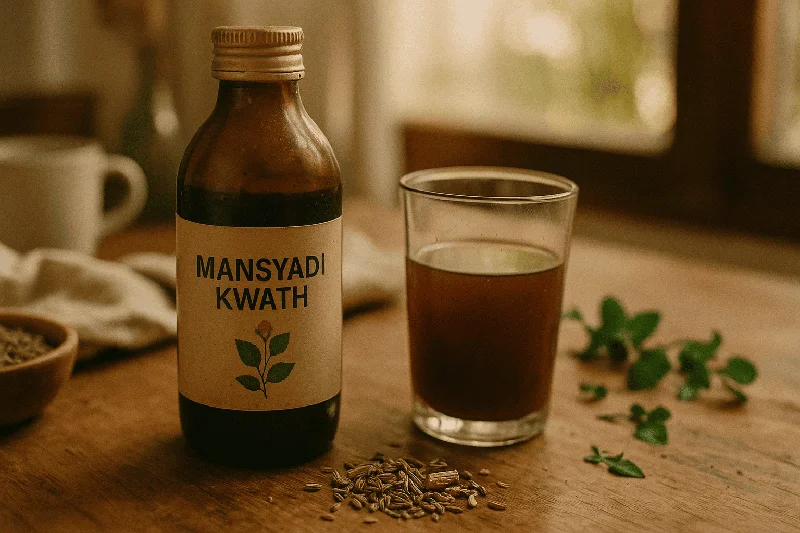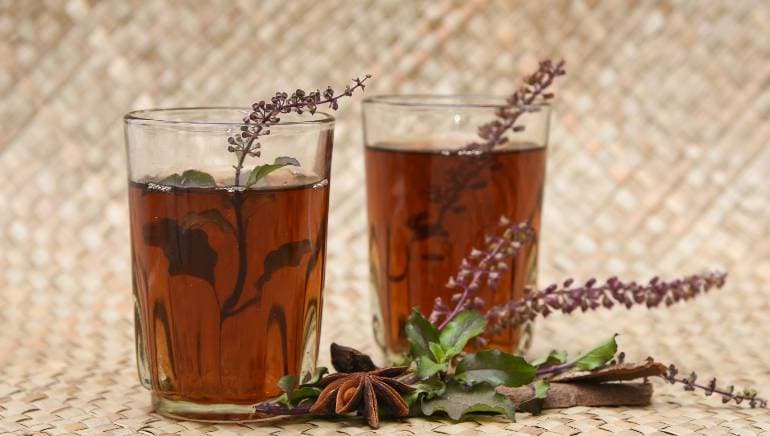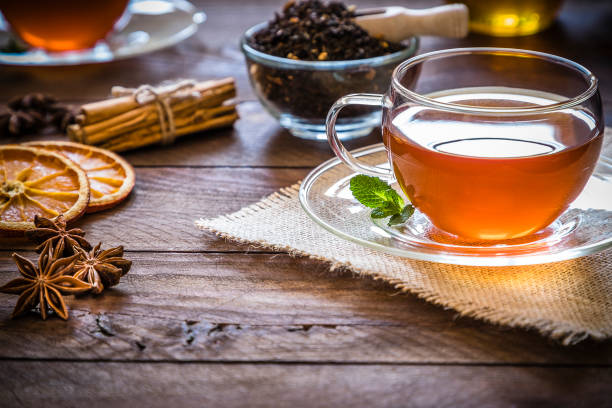Ask Ayurvedic doctor a question and get a consultation online on the problem of your concern in a free or paid mode. More than 2,000 experienced doctors work and wait for your questions on our site and help users to solve their health problems every day.
Mansyadi Kwath – Natural Ayurvedic Remedy for Digestive Health & Detoxification

Introduction to Mansyadi Kwath
Mansyadi Kwath is a potent Ayurvedic herbal decoction made from a combination of various therapeutic herbs. This traditional remedy is widely praised for its role in detoxifying the body, improving digestion, and promoting overall wellness. It is especially known for its effectiveness in addressing digestive disorders, enhancing metabolism, and clearing accumulated toxins from the body. Incorporating Mansyadi Kwath into your daily health routine can support holistic well-being and a more balanced lifestyle.
Don't wait or self medicate. Start chat with Doctor NOW
Historical Roots & Ayurvedic Significance
Mansyadi Kwath, a staple in Ayurvedic medicine, has been used for centuries to promote detoxification and improve digestive health. In ancient Ayurvedic texts, it is highlighted for its ability to balance the Vata and Pitta doshas, which can lead to improved digestion and metabolism. This herbal decoction is traditionally used to purify the blood, reduce inflammation, and aid in the treatment of various digestive and skin-related ailments. Its historical significance reflects its effectiveness as a holistic health remedy.
Key Components & Therapeutic Benefits
1. Herbal Composition
Mansyadi Kwath consists of a variety of potent Ayurvedic herbs, each selected for its specific health benefits:
- Mansyadi (Sida Cordifolia): Known for its anti-inflammatory and digestive properties, it helps soothe the stomach and improves gastrointestinal function.
- Triphala (Amalaki, Bibhitaki, Haritaki): A combination of three fruits, Triphala is widely used for its detoxifying and digestive-supporting properties.
- Ginger (Zingiber officinale): Helps to stimulate digestion and reduces bloating and gas.
- Cumin (Cuminum cyminum): Aids in digestion and relieves indigestion.
- Fennel (Foeniculum vulgare): Known for its ability to relieve bloating, gas, and indigestion.
2. Detoxification & Digestive Health
Mansyadi Kwath is primarily known for its detoxifying properties, helping to clear toxins (ama) from the digestive tract and supporting liver function. It balances the doshas, particularly Vata and Pitta, and improves digestion by stimulating the digestive enzymes and enhancing bile production. This leads to better nutrient absorption, reduction of bloating, and overall improved digestive efficiency.
3. Skin Health & Anti-inflammatory Effects
The detoxifying action of Mansyadi Kwath also extends to skin health. By purifying the blood, it helps reduce inflammation and supports the healing of skin conditions such as acne and eczema. The decoction's anti-inflammatory properties are beneficial in reducing skin irritations, making it an ideal remedy for individuals with skin disorders linked to digestive issues.
4. Integration with Other Ayurvedic Therapies
Mansyadi Kwath can be used in conjunction with other Ayurvedic treatments like Panchakarma (detoxification therapies), Abhyanga (oil massage), and Swedana (herbal steam therapy). These complementary therapies enhance the detoxifying effect of the decoction and support overall health by balancing the doshas and promoting deeper healing.
How Mansyadi Kwath Works: The Science Behind the Decoction
The active compounds in Mansyadi Kwath stimulate digestive enzymes and bile production, aiding the breakdown and absorption of nutrients while facilitating the elimination of waste. Its anti-inflammatory properties reduce swelling and discomfort in the digestive system, improving nutrient absorption. Moreover, the herbs in Mansyadi Kwath help to restore the body's natural balance, supporting both digestive and skin health.
Choosing the Right Ayurvedic Remedies & Guidance
To maximize the benefits of Mansyadi Kwath, it is essential to:
- Consult Certified Ayurvedic Practitioners: A qualified Ayurvedic practitioner can help determine the right dosage and ensure that the remedy suits your body type (Prakriti) and specific health needs.
- Choose High-Quality Herbs: For best results, select Mansyadi Kwath prepared from high-quality, organic herbs.
- Source from Trusted Vendors: Ensure that you buy the product from a reliable Ayurvedic pharmacy or practitioner to guarantee authenticity and quality.
Recommended Dosage & How to Use Mansyadi Kwath
Mansyadi Kwath should be consumed according to the guidance of an Ayurvedic professional. Typically, the following dosage is recommended:
- Dosage: Take 15-30 ml of the decoction once or twice daily, based on the practitioner's advice.
- Consumption: It is typically consumed on an empty stomach or after meals, depending on the individual's health condition.
- Palatability: If desired, dilute the decoction with warm water or add honey to enhance the taste.
- Professional Guidance: Always follow the advice of a qualified Ayurvedic practitioner for the right dosage and regimen.
Potential Side Effects & Precautions
While Mansyadi Kwath is generally considered safe, some individuals may experience mild digestive upset or detox symptoms. It is important to be aware of the following precautions:
- Digestive Discomfort: Due to its strong detoxifying effect, some may experience mild discomfort, including gas or bloating.
- Pregnancy & Nursing: Pregnant or breastfeeding women should consult an Ayurvedic practitioner before using Mansyadi Kwath.
- Start with a Lower Dose: Begin with a smaller dose to monitor how your body reacts and adjust accordingly.
- Allergic Reactions: Discontinue use if you notice any adverse reactions or allergies.
Frequently Asked Questions For Mansyadi Kwath
How does Mansyadi Kwath improve digestion?
Mansyadi Kwath enhances digestion by stimulating digestive enzymes and bile production, which aids in the breakdown of food and the absorption of nutrients. It also helps reduce bloating and indigestion, leading to a more efficient digestive system.
What skin benefits can Mansyadi Kwath provide?
Mansyadi Kwath purifies the blood, reduces inflammation, and supports the healing of skin conditions such as acne and eczema. Its detoxifying properties help address skin issues linked to poor digestion, resulting in healthier, clearer skin.
How should I consume Mansyadi Kwath for optimal results?
Typically, Mansyadi Kwath is consumed in a dosage of 15-30 ml once or twice daily. It can be taken on an empty stomach or after meals, diluted with warm water or mixed with honey to improve taste.
Can Mansyadi Kwath be combined with other Ayurvedic treatments?
Yes, Mansyadi Kwath can be used alongside other Ayurvedic treatments like Panchakarma detox therapies, Abhyanga, and Swedana. These complementary therapies work together to enhance the detoxification process and provide more comprehensive healing.
Are there any side effects of Mansyadi Kwath?
Some individuals may experience mild digestive discomfort or detox symptoms. It is important to consult with an Ayurvedic practitioner to ensure the remedy is appropriate for your body type and health condition.
How long will it take to see results from Mansyadi Kwath?
Results may vary depending on individual health conditions. Some people may notice improvements in digestion and skin health within a few weeks, while others may require a longer duration for noticeable changes.
Where can I buy authentic Mansyadi Kwath?
Authentic Mansyadi Kwath can be purchased from reputable Ayurvedic pharmacies, certified Ayurvedic practitioners, or trusted online stores that specialize in Ayurvedic products. Ensure the quality and authenticity of the product before purchasing.
Conclusion & Expert Insights
Mansyadi Kwath is a valuable Ayurvedic remedy known for its digestive and detoxifying benefits. By incorporating it into your daily routine, you can promote better digestion, enhance metabolism, and support healthy skin. For best results, it is crucial to seek personalized advice from a certified Ayurvedic professional and choose high-quality, organic products to ensure safety and effectiveness.
References & Further Reading
- Sharma, P.V. (1995). Ayurvedic Healing: A Comprehensive Guide.
- Lad, V. (2002). Ayurveda: The Science of Self-Healing.
- National Institute of Ayurveda:
- Journal of Ayurveda and Integrative Medicine for research articles on herbal detoxification.



